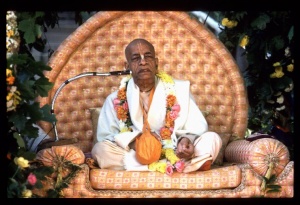CC Antya 3.126 (1975): Difference between revisions
(Vanibot #0027: CCMirror - Mirror CC's 1996 edition to form a basis for 1975) |
(Vanibot #0020: VersionCompareLinker - added a link to the Version Compare feature) |
||
| Line 2: | Line 2: | ||
<div style="float:left">'''[[Sri Caitanya-caritamrta (1975)|Śrī Caitanya-caritāmṛta (1975)]] - [[CC Antya (1975)|Antya-līlā]] - [[CC Antya 3 (1975)|Chapter 3: The Glories of Śrīla Haridāsa Ṭhākura]]'''</div> | <div style="float:left">'''[[Sri Caitanya-caritamrta (1975)|Śrī Caitanya-caritāmṛta (1975)]] - [[CC Antya (1975)|Antya-līlā]] - [[CC Antya 3 (1975)|Chapter 3: The Glories of Śrīla Haridāsa Ṭhākura]]'''</div> | ||
<div style="float:right">[[File:Go-previous.png|link=CC Antya 3.125 (1975)|Antya-līlā 3.125]] '''[[CC Antya 3.125 (1975)|Antya-līlā 3.125]] - [[CC Antya 3.127 (1975)|Antya-līlā 3.127]]''' [[File:Go-next.png|link=CC Antya 3.127 (1975)|Antya-līlā 3.127]]</div> | <div style="float:right">[[File:Go-previous.png|link=CC Antya 3.125 (1975)|Antya-līlā 3.125]] '''[[CC Antya 3.125 (1975)|Antya-līlā 3.125]] - [[CC Antya 3.127 (1975)|Antya-līlā 3.127]]''' [[File:Go-next.png|link=CC Antya 3.127 (1975)|Antya-līlā 3.127]]</div> | ||
{{CompareVersions|CC|Antya 3.126|CC 1975|CC 1996}} | |||
{{RandomImage}} | {{RandomImage}} | ||
==== TEXT 126 ==== | ==== TEXT 126 ==== | ||
| Line 11: | Line 10: | ||
<div class="verse"> | <div class="verse"> | ||
:kāli samāpta habe, tabe habe vrata-bhaṅga | :kāli samāpta habe, tabe habe vrata-bhaṅga | ||
:svacchande tomāra saṅge ha-ibeka | :svacchande tomāra saṅge ha-ibeka saṅga" | ||
</div> | </div> | ||
| Line 25: | Line 24: | ||
<div class="translation"> | <div class="translation"> | ||
"Tomorrow I will surely finish, and my vow will be fulfilled. Then it will be possible for me to enjoy with you in full freedom." | |||
</div> | </div> | ||
| Line 32: | Line 31: | ||
<div class="purport"> | <div class="purport"> | ||
Haridāsa Ṭhākura never wanted to enjoy the prostitute, but he tricked her to deliver her by giving her a chance to hear the holy name of the Lord while he chanted. Pure devotees chant the Hare Kṛṣṇa mantra, and simply by hearing this chanting from a purified transcendental person, one is purified of all sinful activities, no matter how lowborn or fallen one may be. As soon as one is thus completely free from the reactions of sinful activities, he is eligible to render devotional service to the Lord. This is the process for engaging the fallen souls in devotional service. As Lord Kṛṣṇa says in | Haridāsa Ṭhākura never wanted to enjoy the prostitute, but he tricked her to deliver her by giving her a chance to hear the holy name of the Lord while he chanted. Pure devotees chant the Hare Kṛṣṇa mantra, and simply by hearing this chanting from a purified transcendental person, one is purified of all sinful activities, no matter how lowborn or fallen one may be. As soon as one is thus completely free from the reactions of sinful activities, he is eligible to render devotional service to the Lord. This is the process for engaging the fallen souls in devotional service. As Lord Kṛṣṇa says in Bhagavad-gītā ([[BG 7.28 (1972)|BG 7.28]]): | ||
:yeṣāṁ tv anta-gataṁ pāpaṁ | |||
:janānāṁ puṇya-karmaṇām | |||
:te dvandva-moha-nirmuktā | |||
:bhajante māṁ dṛḍha-vratāḥ | |||
"Persons who have acted piously in previous lives and in this life, whose sinful actions are completely eradicated and who are freed from the duality of delusion, engage themselves in My service with determination." | |||
</div> | </div> | ||
Latest revision as of 01:00, 27 January 2020

A.C. Bhaktivedanta Swami Prabhupada
TEXT 126
- kāli samāpta habe, tabe habe vrata-bhaṅga
- svacchande tomāra saṅge ha-ibeka saṅga"
SYNONYMS
kāli—tomorrow; samāpta habe—it will end; tabe—at that time; habe—there will be; vrata-bhaṅga—the end of my vow; svacchande—in full freedom; tomāra saṅge—with you; ha-ibeka—there will be; saṅga—union.
TRANSLATION
"Tomorrow I will surely finish, and my vow will be fulfilled. Then it will be possible for me to enjoy with you in full freedom."
PURPORT
Haridāsa Ṭhākura never wanted to enjoy the prostitute, but he tricked her to deliver her by giving her a chance to hear the holy name of the Lord while he chanted. Pure devotees chant the Hare Kṛṣṇa mantra, and simply by hearing this chanting from a purified transcendental person, one is purified of all sinful activities, no matter how lowborn or fallen one may be. As soon as one is thus completely free from the reactions of sinful activities, he is eligible to render devotional service to the Lord. This is the process for engaging the fallen souls in devotional service. As Lord Kṛṣṇa says in Bhagavad-gītā (BG 7.28):
- yeṣāṁ tv anta-gataṁ pāpaṁ
- janānāṁ puṇya-karmaṇām
- te dvandva-moha-nirmuktā
- bhajante māṁ dṛḍha-vratāḥ
"Persons who have acted piously in previous lives and in this life, whose sinful actions are completely eradicated and who are freed from the duality of delusion, engage themselves in My service with determination."